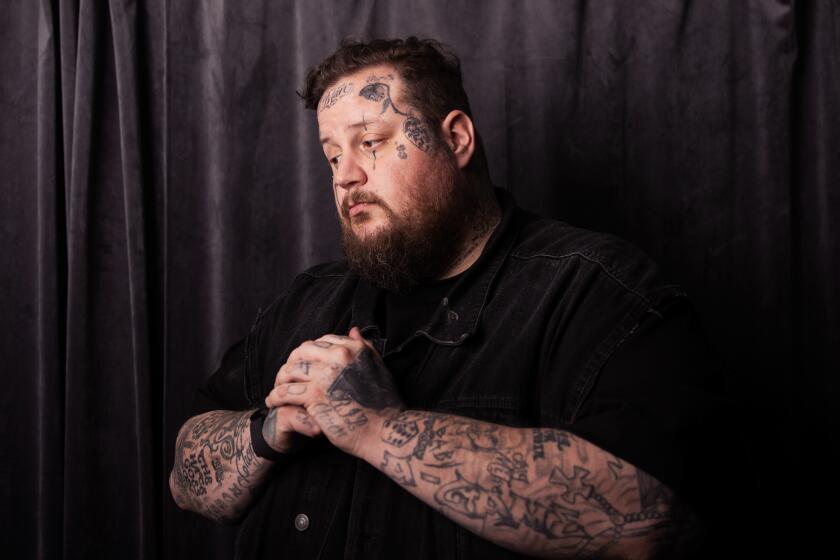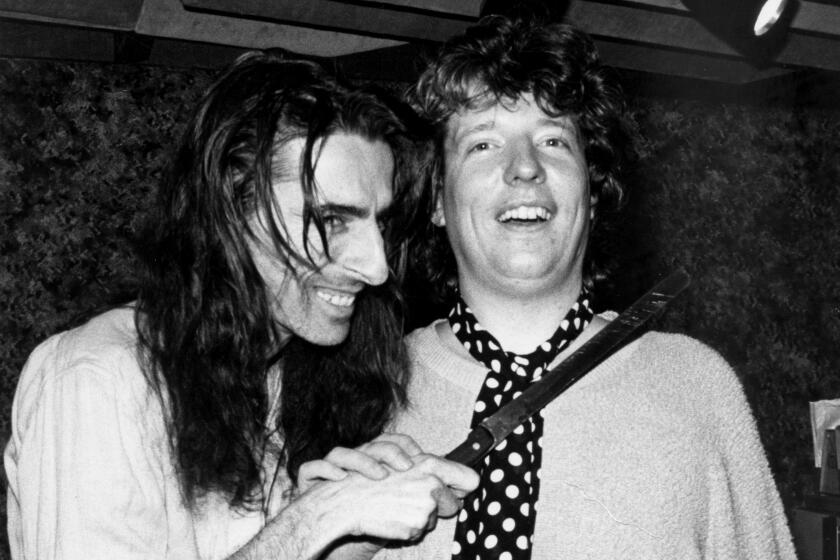POP MUSIC : It Was Hard Being a Cult : David Lowery used to be an alternative kind of guy with Camper Van Beethoven. Now, he’s a Cracker and doesn’t have to apologize for liking Tom Petty and ZZ Top.
- Share via
“For years I was in this semi-famous ‘alternative rock’ band,” says David Lowery, speaking of the late Camper Van Beethoven, a cult favorite among the college radio crowd. “And people would go, ‘What are your influences?’ So I’d usually start at about the punk-rock era . . . and edit out a lot of things. You don’t tell people, ‘Secretly, I listen to the first four Tom Petty records over and over again.’
“You don’t tell people that (ZZ Top’s) ‘Tres Hombres’ is a great record. I remember talking about Led Zeppelin a few times in the earlier Camper days, and the reaction was always, ‘God, you like this horrible ‘70s bombastic thing?’ ”
Right now, it’s not entirely unfashionable to come out of the closet on these matters, as Lowery has. But his emergence extends beyond the admission of enjoying not-so-guilty pleasures of the pre-punk era to encompass the formation of a new group, Cracker, that’s less quirky, more direct and, for lack of a better term, harder-rocking than the historically eclectic Camper Van Beethoven.
In this new context, Lowery’s hoarse-sounding rasp waxes hilariously cynical on songs that range from cranky complaints to tenderly heartfelt laments, while the tuneful music harkens back to the spitfire era of the Stones, when twinges of country informed the power chords. Musically rooted in the ‘70s, and honestly ironic and street-smart in a way barely possible before the ‘90s, Cracker has emerged from the get-go as a casually great American rock ‘n’ roll band.
The new group is predictably a hit with the hep set that felt so warmly toward Camper Van Beethoven. But unlike that group, Cracker is also getting plenty of airplay on mainstream rock stations, getting sandwiched between the likes of, yes, Petty, ZZ Top and Zeppelin. (In Los Angeles radio shorthand, that means that Cracker is making the cut on stations KROQ and KLOS.) Sales so far of “Cracker” are respectable for a debut album, around 100,000 since its release in March.
To Lowery, it’s not unreasonable that his band’s sound should recall one era and its sensibility be of another.
“There are things that you don’t even like now that you heard when you were growing up that have a certain effect on you,” he says. “Like Ted Nugent. I can’t really find a song of his that I like, but in a way, I know that that’s the way guitars should sound. . . . So that’s where the poor taste comes in.
“I never really had a great affinity, actually, for the alternative/underground music scene. If you remember, Camper’s first record was making fun of cool, underground fashion trends in music and stuff like that. I mean, that music tends to be what I listen to, but I’m not really stuck in one scene and never have been. I find that a lot of alternative music isn’t really that alternative; it’s just that the bands happen to be English or are on a certain record label. I try to find good music wherever I hear it.”
A term kept coming up during the recording of Cracker’s debut: Cal-Jam . Lowery defines the C-J feeling as “when you’re getting some groove on a song that is just so stupid and simple that it’s beautiful and powerful. Sometimes we call that ‘bone,’ too, for bonehead, but it’s not bonehead, it’s beyond that--it’s just bone .”
This emphasis on directness and simplicity stands in stark contrast with most of the catalogue of Camper Van Beethoven, which in some of its flights of fancy married Middle-Eastern tempos to traditional folk and rock flavors, with an omnipresent violin and other exotic instrumentation helping out. Lowery doesn’t consider it any sin that the stripped-down Cracker is admittedly less stylistically ambitious.
“I was more interested with this band in playing music that sprung from whatever my direct cultural experience was. Camper had this trip of inventing--’Let’s make up some music from some nonexistent country’--which is great and fine; I have nothing bad to say about Camper, as far as what we did musically. But that approach tended to be more about what goes on in your brain, and this is sort of more like what is in our blood. That was an important distinction for me.
“Ultimately I’ve never been interested in making high art. I’ve always been interested in making pop music all along.”
Lowery has a bit of the provocateur in him--but very little of the poseur. On an afternoon-long visit to Virgin Records’ Beverly Hills offices, he brings a large, frisky dog along--not his (he lives in Richmond, Va., now), but a friend’s, just because he feels more comfortable introducing an unpredictable element into the corporate atmosphere while he’s there. He’s also wearing a pair of de rigueur -for-rockers knee-length shorts. But the ex-Santa Cruz-er is a far from overtly volatile presence.
He offers a telling story about his days in Camper Van Beethoven: “We used to split up on tour with some of us in a van and others in a car, and I remember one day I was driving along and there were some Jethro Tull and Rush tapes in the car.”
Lowery is not so fond of these bands as he is of ZZ Top. “I realized that the guys who liked those tapes were in the van, and I was in the car, and everybody else was asleep except for me. I thought ‘Man, here’s my chance.’ I threw ‘em all out the window.” Even now he can’t quite decide whether to sound penitent. “Yeah, I did a lot of things that weren’t nice and stuff like that with Camper, but basically what it was about was music.”
Camper blew up on the road, so to speak, never finishing a European tour that followed the release of the group’s last album, “Key Lime Pie.” Three of the members had a side project going, the Monks of Doom, which within the last two months has signed a deal with I.R.S. Records. These are the Jethro Tull listeners to whom Lowery alludes.
“They were very important in Camper as arrangers. To me that was their forte. I could come in with a skeleton of a song and they would arrange it in kind of a way that I wouldn’t, and that was the dynamic of Camper that made it beautiful.
“But when it came around to them writing songs and they started going off in this prog-rock/jazz-rock direction, I was like, ‘Sorry, can’t play that.’ They were trying to do stuff like that, that was changing what Camper was, and I didn’t want that to happen, so they eventually left to go do their prog-rock and jazz-rock. Which is cool; I’m not a music critic, so nobody should take that as a major condemnation, but I just can’t play that stuff, and I didn’t want to have anything to do with it. It’s the least sexy music on Earth.”
He can’t resist a last stinger: “I like it that this band (Cracker) stands on its own terms. A lot of people don’t even make the connection between the two groups. I mean, I’m the biggest Camper fan in the world, and so I can relate to fans who would be really bummed out if I was trading on the Camper name and sound instead of making this band stand on its own.
“It’s ironic, I notice, that in the newer Monks of Doom stuff they tend to have these little ethnic waltzes and instrumentals. Considering that they never wrote any of those, it’s weird, trading on it like that. A pet peeve. Anyway, what’s an interview with a broke-up band without a little bit of bitchiness?”
So much for the reunion tour.
After the blow-out, Lowery--who grew up in Texas and Arkansas--moved to Richmond, home of his girlfriend, with Santa Cruz pal and guitarist Johnny Hickman. “We just wanted to see if it was viable, the two of us writing songs together, and playing it cool for a while, just to see what was happening with Camper, if we were really broken up or what.”
After nine months of splitsville, Lowery figured it was safe to form a new band, and brought bassist Davey Faragher into the fold, recording the band’s debut with a pair of session drummers. Eventually the other players all ended up back in California, while Lowery remains in Virginia.
Despite pride in the points of demarcation between his groups, Lowery’s attitude remains much the cocky same in his new music, with a healthy dose of sarcasm in songs like “Teen Angst (What the World Needs Now)” and “Don’t ---- Me Up (With Peace and Love).” It would be easy to dismiss him from these tunes alone as just another snide crank--easy but premature.
“I think a lot of times what I did with Camper and maybe even with this band is perceived as smug. But I would totally disagree and put forth that it’s actually honesty. You’ve got to be pretty ballsy in this day and age of music, I think, to just come out and talk like a normal person would, and my narrative style is just the way that I and most people I know talk .
“You use a little irony, you use a little humor, use a little sarcasm. Sometimes you just say something totally unrelated but that in some way strangely fits in. That to me is what I mean by being honest. And I’ll say, like, some outrageous thing that I think--even though I may not believe it--it wants to cross my lips. You’ve probably found yourself saying something that maybe you don’t quite believe but there’s some reason you need to say it.”
The single “Teen Angst” fleetingly addresses a variety of subjects, including rock semiotics, before finally revealing that this is all subterfuge to the fact that the sorry singer merely wants to “get you in bed.”
The album isn’t all kidding around, though. “Someday” is as close as Lowery comes to poignant, being an anthem for the losers of the world, expressing longing regret that a relationship won’t work until the theoretical day he gets his ship together; “Satisfy You” is a more playful but equally pained exorcism of the frustration of not living up to expectations.
Smug? Nah, just angry, agitated, alienated, the usual stuff--albeit with a self-deprecating humor usually lost in this subject matter.
Alternative? Maybe, given the other possibilities available to rock fans. But more than anything Cracker seems a band that encompasses all the contradictions that the best rock ‘n’ roll has always been full of, and--if not necessarily “what the world needs now”--might just be a band to help take the labels off.
“I’ve been in and out of fashion with so many facets of the alternative and underground music scenes so many times that pretty early on I really stopped caring about it,” he says, “and realized that having poor taste--in the sense that some of the stuff you like just isn’t cool--is probably a virtue. Because it’s about music then. That becomes ultimately what you care about, the music itself, rather than all the trappings that surround it.”
More to Read
The biggest entertainment stories
Get our big stories about Hollywood, film, television, music, arts, culture and more right in your inbox as soon as they publish.
You may occasionally receive promotional content from the Los Angeles Times.










